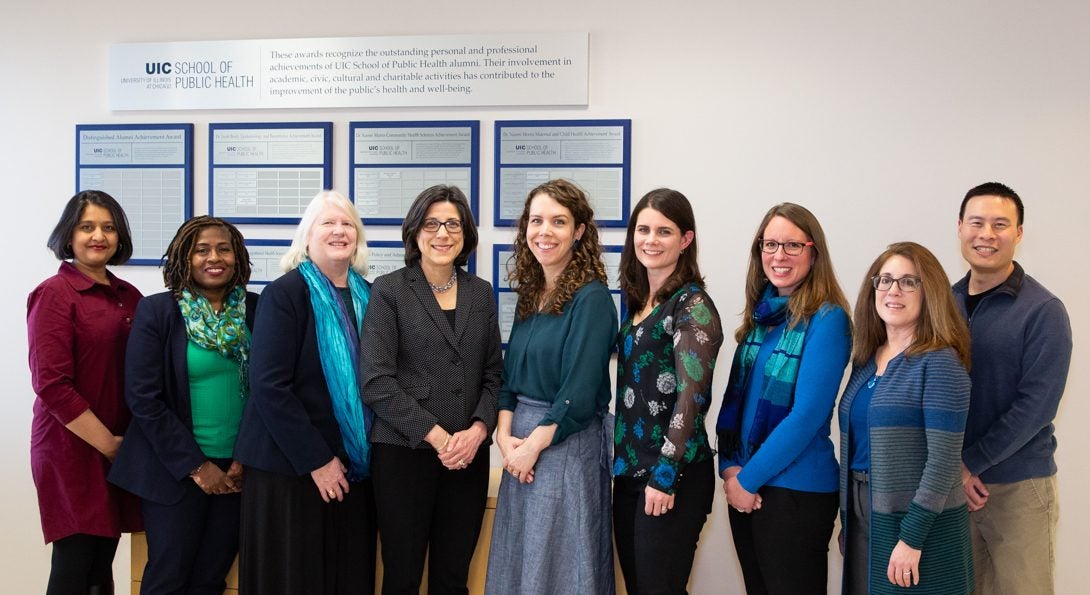Evidence, Translation and Impact Take Center Stage

Spurred by $3.75 million in research funding from the U.S. Centers for Disease Control and Prevention (CDC), the Policy, Practice and Prevention Research Center (P3RC) at the University of Illinois Chicago (UIC) School of Public Health – one of only 25 academic institutions in the CDC’s Prevention Research Center network – aims to build evidence, leadership and capacity for policy, programs, systems and environmental-oriented changes designed to improve population health and address equity. In collaborative partnership with like-minded allies such as local health departments and institutions like Chicago Public Schools (CPS), P3RC faculty are currently undertaking various projects to build and use actionable evidence that will impact communities in positive, useful ways.
“Our focus and aspiration are on large-scale, evidence-based changes,” assures P3RC principal investigator Lisa Powell, PhD, distinguished professor and director of health policy and administration.
The P3RC's flagship project
The P3RC’s headline project, the Healthy CPS Network Initiative aims to improve student wellness in the nation’s third-largest school district by establishing a Healthy CPS Network Specialist position dedicated to health and wellness-related issues in CPS’ geographic networks. The pilot program will be tested in Network 5 on the city’s West Side, one of the district’s 17 geographic networks.
Based on the CDC’s Whole School, Whole Community, Whole Child model (WSCC), a comprehensive child-centered framework that includes elements such as physical activity, nutrition, health education, health services and community involvement, the Healthy CPS Initiative demonstrates a school’s commitment to a safe and healthy learning environment by offering access to daily physical activity, nutritious foods, school-based health services, health education and supports for students with chronic conditions.
“This project allows CPS to build on the great momentum it’s created in health and wellness and supporting the whole child,” says Jamie Chriqui, PhD, professor of health policy and administration, the principal investigator on the project and a nationally recognized expert in school wellness. “Miraculously, we were able to complete our school wellness team discussion groups virtually during the shelter-in-place order. The specialist was hired and on-boarded in the spring of 2020, and a draft of the specialist’s Toolkit, which will guide their school-level interactions, was created.”
The specialist’s primary task is to develop and help institute a health and wellness action plan for each of the 26 Network 5 schools, an effort already underway with a targeted needs assessment at each school based on factors such as health data, public assistance enrollment and existing school practices. The specialist will then help schools activate their action plans with a focus on creating a sustainable program that leverages community partnerships and bolsters student health. “The specialist has already been working with the intervention network and is on-track to be fully integrated when schools resume in September, regardless of in-person or on-line learning,” says Chriqui.
Ultimately, researchers hope to generate sound evidence that employing a specialist pushes student health and performance in a positive direction. “It’s our shared dream for each network to have its own specialists, but before doing that we need to provide evidence that this program makes a difference,” Chriqui says.
For Tarrah DeClemente (MPH ’12), the manager of health promotion at CPS’s Office of Student Health and Wellness and a co-principal investigator on the project, the P3RC-driven project allows the 350,000-student district to test more focused health and wellness efforts and then assess their impact. “It’s one thing to have a policy, another to implement it and yet another to assess its effectiveness. This program will provide much-needed data and metrics for our office to improve programming for schools,” says DeClemente, who considers SPH and Chriqui ideal partners given their credibility and shared interest in supporting the whole child.
If proven successful in Network 5, the researchers hope to expand the initiative across CPS and to have it serve as a template for other U.S. school districts. “Most districts follow WSCC, but they haven’t taken such a tailored approach. Our hope is that we develop a model others across the country can follow,” Chriqui says.
Projects designed to boost health and equity

Beyond its signature Healthy CPS Initiative, the P3RC will study a diverse array of public health issues and support its public health partners in leveraging research data and advocating for policies and practices that heighten population health and equity.
“Our driving purpose is to build leadership and capacity to help effective policy and programs take shape and to do that with equity in mind,” Powell says.
The CDC has already funded two additional special interest projects from P3RC faculty. The first, ICARE, a pilot study led by UI Health Department of Emergency Medicine professor Dr. Heather Prendergast, MPH in Health Policy and Administration ’07, MS in Clinical and Translational Science ’14, Master of Healthcare Administration ’19, will look to improve care for cancer patients by standardizing emergency department protocols, increasing cancer survivors’ engagement with primary care physicians and assessing the feasibility of improved early detection for breast and cervical cancer through the emergency department.
In the second CDC-funded project, Chriqui and colleagues at the University of Massachusetts Medical Center are co-leading the CDC’s Physical Activity Policy Research and Evaluation Network (PAPREN). As part of PAPREN, Chriqui is spearheading an applied evaluation project to examine how changes in pedestrian-oriented zoning and land use policies across more than 3,000 U.S. municipalities and unincorporated county areas have impacted recreational physical activity and sedentary behavior, commuting to work and pedestrian fatalities.
The P3RC’s work with CPS, meanwhile, extends into a second project led by Elizabeth Jarpe-Ratner, PhD in Community Health Sciences ’18, a clinical assistant professor in the Division of Health Policy and Administration. Jarpe-Ratner is currently evaluating adolescent health promotion in Chicago’s schools, reviewing current CPS policies, curriculum and services to support sexual health. She plans to use her findings to develop technical assistance, training, progress monitoring and resources for CPS students and staff.
Additionally, Powell is leading a large-scale Bloomberg Philanthropies-funded policy evaluation of sugary beverage taxes in multiple jurisdictions across the U.S. The evidence of that work is being translated through P3RC research briefs.
The P3RC will also continue a 25-year collaboration that the UIC School of Public Health has had with the Illinois Department of Public Health (IDPH) on academic-practice initiatives focused on increasing the state’s capacity to enhance public health. Specifically, P3RC faculty will work with partners to produce a State Health Assessment, State Health Improvement Plan and Strategic Plan aimed at fueling health improvement in Illinois.
To build additional capacity for policy, program, systems and environmental (PPSE) prevention research and public health practice at SPH, the P3RC will also offer pilot grants for SPH faculty. “These efforts will build research capacity so we’re fostering larger projects and expanding our impact,” Powell says.
Addressing the research-practice divide

While evidence-based research is so central to P3RC’s mission, so, too, is disseminating and translating findings into best practices and policies for sustainable, widespread scale-up. That, Powell says, requires baking translation objectives into every project from the get-go. “Translation is too often an afterthought, but we’re thinking about translation from the beginning of every project,” she says, adding that the P3RC will publish policy and research briefs with the expressed goal of helping its partners translate evidence into real-world impact.
Christina Welter (DrPH ’10), director of the DrPH in Leadership Program and clinical assistant professor of health policy and administration, will lead the P3RC’s training and translation arm, where she will work to reduce the all-too-common barriers between researchers and practitioners and facilitate a more timely exchange of ideas that positions practitioners to promote systems-level changes.
To support this effort, the P3RC is launching the Building Illinois’ Leadership Policy and Practice Capacity Initiative (BILPPCI). Through a deep-dive, mixed-methods assessment of local health departments and peer academic institutions, the BILPPCI will help partners understand their capacity for evidence-based decision making and enacting PPSE-oriented change. Welter and her team will later use those assessment results to develop a translation agenda for Illinois. “It’s a multi-phase project to understand our partners’ strengths, gaps, assets, needs and challenges, so we can build evidence that informs policies and practices, whether that’s for the minimum wage or bike lanes,” Welter says. “It’s a large, lofty effort, but something we believe will leave a mark.”
The assessment results will also guide the creation of the P3RC’s Skills Institute as well as leadership and learning communities for public health students and practitioners. In particular, public health partners will be able to apply to the Skills Institute, where Welter and Guddi Kapadia, assistant director of the MidAmerica Center for Public Health Practice, will provide action-oriented, evidence-based training focused on working as an organization and with partners to develop, implement and evaluate evidence-based PPSE approaches to improve population health. Welter says the Skills Institute will provide practitioners relevant workforce development to improve their readiness and capacity to build and use evidence. “We need evidence that’s actionable at the local level and to build evidence in ways that reflect local communities’ challenges, assets and opportunities,” Welter says. “When we work with partners in real time and discuss potential changes, they will be better positioned to make faster, better decisions and make a difference in their communities.”
One of the key features of P3RC is to remain responsive to its partner needs during current and future public health challenges. For example, Welter supported the IDPH during the Spring 2020 COVID-19 response as one of the organization’s Deputy Incident Commanders. “I provided technical assistance to IDPH for 10 weeks to expand strategic and performance management systems, institute situations awareness and data reporting systems, and build out bi-directional communication and partnership approaches,” Welter says. She is also working with IDPH to assess its response to COVID-19, as well as build its equity and anti-racism approaches, in a proactive way. Welter and her colleagues from the Illinois Public Health Institute are conducting the State Health Assessment and State Health Improvement Plan, and have integrated these important topics and initiatives into their inquiry to help the state plan for its future.
Between the P3RC’s enterprising research projects and its bold translation objectives, Powell acknowledges the SPH-housed center holds an admittedly ambitious slate. Undeterred, she relishes the ability to build capacity and strengthen relationships with public health partners and savors the opportunity to address pressing public health needs and advance the center’s research portfolio. “We see an opportunity for improvements in population health and equity through a paradigm shift that builds capacity and bridges practice, translation and research,” Powell says. “We’re ready to contribute in meaningful ways.”